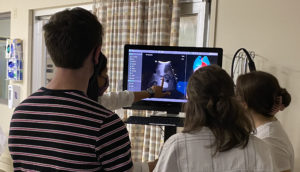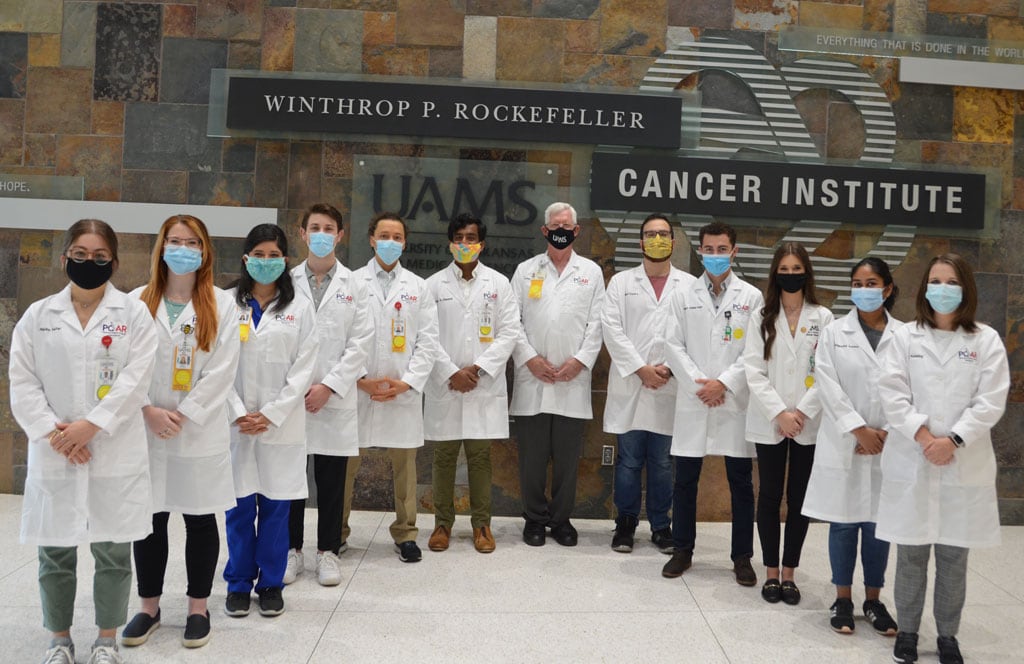Winthrop P. Rockefeller Cancer Institute Hosts First Summer Research Intensive for Medical Students
| New discoveries in cancer treatment might come from 24-year-old Nadia Safar, one of 12 UAMS medical students participating in the state’s first and only undergraduate cancer research program at the Winthrop P. Rockefeller Cancer Institute.
“Cancer is one of those diseases that’s not well understood,” said Safar, whose father is an oncologist. “There are still so many unanswered questions about the disease, so the research is really interesting.”
Safar and the work of her classmates is being led by Thomas Kelly, Ph.D., associate director for Cancer Research Training and Education, and Richard Nicholas, M.D., professor in the College of Medicine’s Department of Orthopaedics and director of the Cancer Institute’s Center for Bone and Soft Tissue Tumors. Beatrice Boateng, Ph.D., professor in the College of Medicine’s Department of Pediatrics serves as the evaluator of the program. Diane McKinstry, BBA is the program manager.
The eight-week summer intensive is funded by an $870,000 R25 grant from the National Institutes of Health (NIH) Partnership in Cancer Research (PCAR).

UAMS’ Nayanatara Swamy, M.D., (far left) points out abdominal structures detected by ultrasound on a manikin in the UAMS Simulation Center. Medical students looking on are part of UAMS’ first summer cancer research program funded by the National Institutes of Health.
Rising second-year medical students are being immersed in hands-on cancer research that includes clinical simulations and broad exposure to cancer screening, treatment and palliative care. The program, which continues every summer through 2025, gives students critical insights into cancer biology, treatment and care that range from how new therapeutic targets are identified, to understanding patient problems with health care access and defining disparities in the outcomes of cancer treatments.
“Our goal is to ignite the imaginations of future physicians,” said Kelly. “The combined visions of students might produce new public health policies, new cancer treatments, and better participation in clinical trials. That might pave the way to better access to care for all cancer patients, increased survival and better quality of life, and new ways to counter disparities in cancer treatment outcomes.”
Key components of the program include:
- Individual student research projects
- “Live from the Lab” oral reports
- A Cure Cancer Entrepreneurship program with BioVentures
- Clinical experiences in the UAMS Simulation Center and Palliative Care Clinic
- Observation of the angiosarcoma Facebook support group
- Death Over Dinner, a creative end-of-life discussion
Basic and clinical research are at the core of the program. Student research is carefully guided by UAMS faculty and reviewed at the end of the summer session. Each of the 12 students is working on a cancer-related project with one of the following mentors: Carolina Schinke, M.D., Gary Lewis, M.D., Matthew Steliga, M.D., Kimberly Stephens, Ph.D., Donghoon Yoon, Ph.D., Fenghuang Zhan, M.D., Ph.D., Alan Diekman, Ph.D., Gunnar Boysen, Ph.D., Robert Griffin, Ph.D., Jason Farrar, M.D., Steven Post, Ph.D., Jia Liu, Ph.D., and Fen Xia, M.D.,Ph.D.
Safar’s research focuses on the role of macrophage class A scavenger receptors in breast tumor treatment. She wants to know if these receptors, or SRAs, dampen the immune response to a cancer cell. Post is Safar’s mentor.
“It’s as if the receptors are telling the immune system to calm down so the cancer cell can grow into a full-blown tumor,” said Safar, who lost her grandfather to colorectal cancer and a 2-year-old cousin to a rare form of leukemia.
Four weeks into the eight-week program, students have visited the UAMS Simulation Center where they were introduced to breast ultrasound, transabdominal ultrasound and fine-needle aspiration. Students learned how to conduct a thorough, patient-centered breast exam.
Weekly learning sessions with UAMS faculty give context to students’ research. “It’s easy to get lost in the research. We had a lecture on carcinogens that hit on some of the things we were researching. It’s really been a good integration of clinical experience and research,” said Safar.
The hands-on part of the program included a standardized patient interaction in which students counseled the parent of a 12-year-old who was apprehensive about her child receiving the HPV vaccine. “It was such a good experience because it was uncomfortable,” Safar said.
As students pursue their research projects, they will have the opportunity to work with BioVentures fastPACE program, which introduces them to entrepreneurship and biomedical commercialization.
“It’s been very exciting to work with these students,” said Kelly. “They are bright, enthusiastic and fun. To see all these ideas we proposed to NIH two years ago come to life is gratifying.
“We hope students gain insight into how cancer research really works, and how it fits into our overall effort to improve outcomes for cancer patients,” he said.
Other UAMS faculty participating in the program include Nicole Massoll, M.D., Nayanatara Swamy, M.D., Patrick Jennings, M.D., and Ryan Campbell, M.D.
